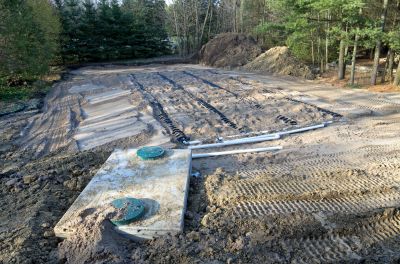Leading Leach Field Replacement Options For Seamless System Upgrades
Choose from top-rated products that support smooth installation and reliable operation of your leach field.
 Replacing a leach field is a critical step in maintaining a functional and efficient septic system. The process involves selecting appropriate products that ensure proper drainage, prevent clogging, and accommodate the specific soil and site conditions. Various components are used in leach field replacements, including distribution boxes, drain pipes, gravel beds, and filter fabrics. Each element plays a vital role in ensuring the septic system operates smoothly and reduces the risk of failures or backups. When considering replacement options, it is essential to evaluate the durability, compatibility, and installation requirements of each product type.
Replacing a leach field is a critical step in maintaining a functional and efficient septic system. The process involves selecting appropriate products that ensure proper drainage, prevent clogging, and accommodate the specific soil and site conditions. Various components are used in leach field replacements, including distribution boxes, drain pipes, gravel beds, and filter fabrics. Each element plays a vital role in ensuring the septic system operates smoothly and reduces the risk of failures or backups. When considering replacement options, it is essential to evaluate the durability, compatibility, and installation requirements of each product type.
Top Overall Option
Flexible Perforated Drain Pipe System
A flexible perforated drain pipe system offers adaptable installation options suitable for various leach field configurations. Its design allows for easy bending around obstacles, ensuring optimal coverage and drainage. Made from durable, high-quality materials, it resists cracking and degradation over time, providing a reliable conduit for wastewater distribution. This type of pipe is compatible with different bedding materials and can be used in both new installations and replacements, making it a versatile choice for many septic system projects.
Types of Products For Leach Field Replacements
Perforated Drain Pipe
Perforated drain pipes are designed to evenly distribute effluent across the leach field while allowing water to enter from the surrounding soil.
Filter Fabric Wraps
Filter fabrics help prevent soil and debris from clogging the drain pipes, maintaining system permeability.
Gravel and Rock Beds
Gravel beds provide a supportive base for drain pipes, aiding in filtration and drainage efficiency.
Distribution Boxes
Distribution boxes evenly distribute effluent from the septic tank to the leach field pipes.
Inspection Ports
Inspection ports allow for easy access to monitor and maintain the leach field.
Septic Tank Adapters
Adapters connect the septic tank to the distribution system for seamless effluent flow.
PVC Pipe Fittings
PVC fittings are used to connect different sections of drain pipes securely and reliably.
Septic Tank Baffles
Baffles prevent solids from entering the leach field, protecting system integrity.
Septic Pumping and Maintenance Kits
Maintenance kits facilitate routine cleaning and inspection of septic components.
Drain Field Risers
Risers provide easy access to the leach field for inspection and servicing.
Leak Detection Sensors
Sensors help identify leaks or failures within the leach field early on.
Septic System Sealants
Sealants ensure airtight and watertight connections between components.
Drain Field Cover Materials
Cover materials protect the leach field from surface runoff and physical damage.
Aeration Systems
Aeration can enhance soil absorption and reduce odors in certain leach field setups.
Popular Choices
A widely used component for distributing effluent evenly across the leach field.
Commonly chosen to prevent clogging and maintain drainage efficiency.
Popular for creating a stable base and aiding filtration in leach fields.
Essential for even distribution of effluent from the septic tank.
Frequently used for easy access during maintenance and inspections.
Commonly selected for reliable connections in drain pipe networks.
Popular for preventing solids from entering the leach field.
Popular for providing easy access to the leach field for inspection.
Trending for early leak detection and system health monitoring.
Often used to protect the leach field surface from damage.
Popular for routine upkeep and system longevity.
A successful leach field replacement often requires a combination of these components to create an effective drainage network. Proper installation and high-quality materials can extend the lifespan of the system and improve overall performance. It is advisable to consult with septic system professionals to determine the most suitable products based on site-specific conditions, such as soil type, water table level, and usage patterns. Investing in reliable, well-designed products can help prevent costly repairs and ensure compliance with local regulations.
In addition to the core components, accessories like inspection ports, distribution pipes, and septic tank adapters may be necessary for a complete replacement setup. Choosing products that are easy to install and maintain can also save time and effort in the long run. Whether undertaking a full replacement or a partial upgrade, selecting the right products is a key step toward restoring the functionality of a septic system and safeguarding property health.
Key Buying Considerations
- Compatibility with existing septic system components
- Material durability and resistance to degradation
- Ease of installation and maintenance requirements
- Appropriate sizing based on household or property needs
- Soil type and drainage characteristics of the site
- Local regulations and code compliance
- Availability of replacement parts and accessories
- Cost-effectiveness over the system's expected lifespan
- Ability to accommodate future system upgrades or expansions
- Environmental conditions that may impact material performance
- Manufacturer reputation and product reviews
- Warranty and support options provided by the supplier
- Ease of access for inspection and servicing
- Compatibility with different bedding and bedding materials
- Potential for customization or modularity in system design
